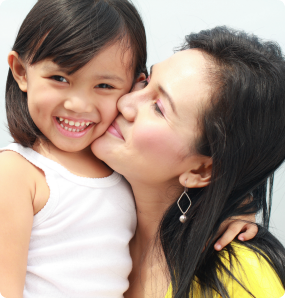 Mom, can you drive me to school?
Mom, can you drive me to school?
Sorry, I’m really busy today.
Mom, can you get me the scissors?
Why can’t you get them? You know where they are.
Mom, can you help me clean my room?
You know that’s your responsibility. I know you can do it.
Mom, can you lay with me in bed until I fall asleep?
Oh, honey, I’d love to but I really need to get the kitchen cleaned.
No, no, no. I can’t even count the number of times I implicitly or explicitly say no to my children every day.
Recently I attended a conference for parents of adopted or foster kiddos given by the fine people at Empowered To Connect. I was deeply convicted when I heard this fact: During a baby’s first year of life, they hear “yes” 100,000 times. “Yes, I will feed you.” “Yes, I will hold you.” “Yes, I will change your diaper.” “Yes, I will care for you.” They cry, and a parent or caregiver responds by meeting their need. Yes, yes, yes.
This response by a warm and nurturing adult lets the child know that they are heard, seen, valued, loved. And, most importantly, that they have a voice — that they can affect their own circumstances. This belief that we can succeed or reach goals through our own effort is known in psychology as self-efficacy, and it’s vital for kids’ development.
This concept clearly applies to adoptive and foster families but it is easily transferable to all families.
In our rushed and crazy world, it is far too easy to say “no” to our children. What if, instead, you looked for the “yes” before saying “no?”
For instance, my almost nine-year-old daughter loves when I paint her nails. However, I don’t love painting nails – not mine, not hers. When she asks, I immediately feel my dislike of the task and I’ll say, “Um, you know I need to fold this basket of laundry first, and then if we have time I’ll paint your nails” hoping she’ll forget or move on to other things.
What if, instead, I focused on the potential to connect with her? What if I were to enthusiastically say, “Yes! Let’s paint your nails and then you can sit and keep me company while your nails dry and I fold this basket of laundry.”
She will have felt heard and loved. And we’ll have had a connective moment.
Amy Monroe, from Empowered to Connect, says that each “yes” is like a coin in the bank. So when you need to make a “no” withdrawal there is still plenty of trust built up. This makes it easier for kids to hear and accept the inevitable “no.”
Now, when my kids ask me a question I quickly think, “Will this build our relationship? Will it draw us closer? Will it make my child feel heard and loved?” If it will, then I give a joyful and enthusiastic, “Yes!”
These yeses will act as a buffer around my kiddos’ hearts when I continue to say no to the incessant and exhausting request for their own phone, or the occasional request for a movie I’m uncomfortable with them watching.
But most importantly, my joyful yeses make sure my children know that I love and enjoy them, even though I can’t say yes all the time.
Anna Braasch, Executive Director for Connected Families, and her husband Grant adopted both of their children through Children’s Home. Alex joined the family in 2005 and Almaz joined the family in 2007, both from Ethiopia. This blog was originally published on Connected Families.


